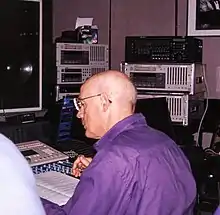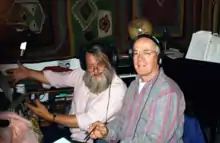Laurie Scott Baker
Laurie Scott Baker (born 1943 in Sydney, Australia) is a British composer and musician of Experimental and Electronic music.[1] He was a pioneer of live electronics and graphic scores from the 1960s.


Life and career
From 1958 he studied at the Julian Ashton Art School. His musical career began playing double bass at the El Rocco jazz cellar, Sydney's major jazz venue at that time, with his school friend pianist Serge Ermoll.[2] He worked for the Sydney Morning Herald as a trainee graphic artist.[3]
Baker left Australia in 1964, working his passage in the band on the Greek liner 'Patris'.
In London he worked on several collective projects with the composer Cornelius Cardew. He took part in Music Now, a concert society founded in 1968 by Victor Schonfield which introduced avant-garde music to British audiences,[4] including the first UK performance of In C and also in the first performances of the composers Frederic Rzewski and John White. He took part in Christian Wolff's 'Burdocks' concert.[5] He was a member of the Scratch Orchestra from its formation in 1969. Following on from this came the formation in 1972 of People's Liberation Music with John Tilbury and John Marcangelo. Baker was a founder member in 1976 of Progressive Cultural Association and was also active in the Musicians Union.
There were also collaborations with Alan Gowen, Jamie Muir, and Allan Holdsworth in 'Sunship' and with Greg Bright in 'Maze'.[6]
Baker played in various West End theatre productions including Hair (1968). There was also recording session work, including with Manfred Mann, Bob Downes, Ray Russell, Alex Harvey and others. He also composed music for film and television with two songs for the feature film, Secrets (1971) [7] performed by Maggie Bell and another by the Cymarons, an early reggae band.
In 1976 he was commissioned by Unity Records to compose and produce a record celebrating the anniversary of the 1926 British General Strike using traditional working class music forms such as brass bands, industrial ballads, and contemporary rock; John Marcangelo was the composer on the 2nd side. Its final production was blocked by the Arts Council.[8]
In 1977/8 he composed and produced the music for two animations by Geoff Dunbar, 'Lautrec' (1974) and the cult movie 'UBU' (1978).[7][9] He also worked with Richard Keith Wolff on the short film "Still Life" (1980).[10]
At the beginning of the 1980s he worked doing film dubbing mixing for the BBC while continuing to compose music for Television and Radio. In the 1990s he mainly worked on commissions for BBC Radio Drama including several series.
| Year | Title | |
|---|---|---|
| 1990 | Burnt | A six-part political thriller by Nigel Baldwin. with Dennis Waterman [11] |
| 1991 | The Monday Play A Stranger in the Tea Leaves | by William Ingram.[12] |
| 1992 | Cordoba | six-part thriller by Nigel Baldwin , starring Alison Steadman [13] |
| 1993 | The Monday Play: Much Ado About Nothing | [14] |
| 1997 | Broad Canvasses | A three-part drama by Nigel Baldwin[15] |
He left the BBC in 1995 and returned to full time music as Artistic Director of the Musicnow record label which was set up in 1991.
A short animation 'Echidna' was produced for S4C in Wales and shown at several festivals including the Short Film Festival Flickerfest (2004) in Sydney and also on ABC.
In 2013 an exhibition of his graphic scores from the 1960s was held at SNO (Sydney Non Objective Contemporary Art Projects).[2]
Discography
| Year | Title | |
|---|---|---|
| 1963/4 | Serge Ermoll Trio | |
| 1968 | London Cast of Hair [16] | CD Polydor no. 5199732 / LP Polydor no 583 043 stereo |
| 1969 | Roman Wall Blues - Alex Harvey | Fontana / STL 5534 |
| 1970 | Fresh Hair | Polydor no 2371 066 stereo |
| 1972 | Bob Downes Open Music - Diversions | LP BDOM001 stereo |
| Messin' - Manfred Mann | Vertigo – 6360 087 | |
| 1975 | Words & Music (1975) - Tom Phillips | Limited Edition [17] |
| 1994 | Flotsam Jetsam - Robert Wyatt | Rough Trade R3112 |
| 2002 | We Only Want the Earth | Musicnow MNCD004 |
| 2007 | Consciously | Musicnow MNCD 009 |
| 2008 | Liquid Metal Dreaming | Musicnow MNCD010 |
| 2009 | Gracility | Musicnow MNCD012 |
References
- Helliwell, Ian (2016). Tape Leaders: A Compendium Of Early British Electronic Music Composers. Sound on Sound Ltd. p. 17. ISBN 978-0995495807.
- Paull, James (26 May 2014). "Laurie Scott Baker — Scratching the Surface" (PDF). SNO Contemporary Art Projects.
- Scott Baker, Brigid (19 July 2009). "Biographical Notes". British Composers Project.
- Scott Baker, Brigid (28 February 1998). "Background to the original MUSIC NOW". Musicnow.
- Horner, Keith (29 March 1972). "Christian Wolff". Times [London, England]. p. 13 – via The Times Digital Archive.
- "Laurie Baker Bass & Synthesizers". CALYX The Canterbury Music Website.
- "Laurie Scott Baker". IMDb.
- "Unity Records Co-operative". Undercurrents. 20: 40. February–March 1977.
- "Laurie Scott-Baker". BFI.
- "Filmography". Richard Keith Wolff. Retrieved 8 January 2021.
- "Burnt". BBC Genome Project. 8 November 1990.
- "The Monday Play: Stranger in the Tea Leaves". BBC Genome Project. 14 November 1991.
- "Cordoba". BBC Genome Project. 6 August 1992.
- "The Monday Play: Much Ado About Nothing". BBC Genome Project. 26 August 1993.
- "Broad Canvasses". Genome Radio Times 1923-2009. 2018.
- "Laurie Baker". Allmusic.
- "Words and Music". Tom Phillips.